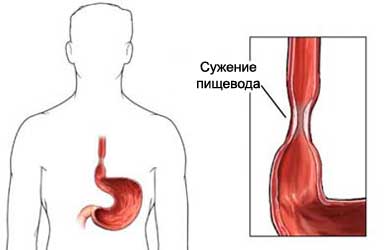Expansion of the esophagus – Dilation of the esophagus
Description Expansion of the esophagus
Esophagus – muscular tube, through which food and liquid coming from the mouth to the stomach. If the esophagus is too narrow, there may be problems with swallowing.
During esophagus physician inserts expansion device in the form of a tube into the esophagus, to expand its narrow part. This procedure makes it easier to swallow food and to eat normally.
Expansion of the esophagus – the reasons for the operation
The expansion is carried out for the treatment of esophageal narrowing of the esophagus, so-called stricture. Stricture occurs when scar tissue build-up, that may be associated with the following diseases:
- Gastrointestinal reflux disease (GERD);
- Damage to the esophagus.
Dilation of the esophagus widens the esophagus. Some patients may require a repeat procedure within a year.

Possible complications of esophageal extension
Complications are rare, but no procedure does not guarantee the absence of risk. If you plan to carry out the expansion of the esophagus, you need to know about possible complications, which may include:
- Bleeding (including coughing up blood or vomiting blood);
- Bad reaction to the anesthesia or sedatives;
- Chest pain;
- Breathlessness;
- Infection;
- Soreness and pain in the throat;
- Nausea and vomiting;
- Severe swelling in the middle part of the chest;
- The gap or hole in the lining of the esophagus (It can lead to bleeding and the need for additional surgery).
Some factors, that may increase the risk of complications:
- Obesity;
- Smoking;
- Diabetes;
- Problems with heart or lung.
How is the expansion of the esophagus?
Preparation for the procedure
A few days before the procedure:
- We need to organize a trip for the operation and home from the hospital. Besides, ask someone to help you at home;
- If there is an indication of a doctor, Do not eat or drink for six hours before the procedure.
Before the procedure, the expansion of the esophagus:
- Tell the doctor if any allergies;
- Ask, whether you need to take antibiotics before the procedure;
- Consult your doctor about the drugs taken. A week before surgery you may be asked to stop taking some medicines:
- Aspirin and other nonsteroidal anti-inflammatory drugs (NSAIDs) (eg, Ibuprofen, naproxen);
- Blood-thinning drugs, such as warfarin;
- Antiplatelet drugs, like clopidogrel.
Anesthesia
In some cases it will be used general anesthesia. It will block any pain and keeps you asleep during the procedure.
It can also be used local anesthesia, to numb the esophagus. Sedation will help you relax and calm down.
Procedure enlargement of the esophagus
Expansion of the esophagus, usually, held in conjunction with endoscopy. During an endoscopy, the doctor inserts a thin, a flexible tube through the mouth and into the esophagus. The tube has at the end of the light source and the camera, allowing the physician to see the esophagus on a monitor.
It may also be used fluoroscopy, especially at the moment, when installed extender (dilaktator). When fluoroscopy, X-ray image is displayed on the monitor of the esophagus.
After determining the location of the stricture, doctor decides, what type of expander used, to stretch it. Depending on the severity of the stricture, your doctor may choose to install the plastic expander or expansion of the stricture via balloon.
When installing the plastic expander doctor will use an endoscope. This will allow the doctor to establish an expander in the right place. After determining the location of the, the endoscope is removed, a tapered dilator is inserted through the mouth and throat, and set in place strictures.
If the extension is carried out with a balloon, the place of installation is also determined by using an endoscope. Thereafter the expander is supplied to the right place, the doctor inflates the balloon to a certain size to expand the stricture.
How long will the expansion of the esophagus?
About 15 minutes.
Expansion of the esophagus – Will it hurt?
In most cases, you will not feel any pain or discomfort during the procedure. In the next few days may feel discomfort in the throat.
Care after the enlargement of the esophagus
Care in a hospital
You will be taken to the recovery room. The hospital staff checks the gag reflex. Gag reflex is a natural reaction of the body to hit deep into the throat of a large object. It allows you to prevent choking.
Home Care
Follow these steps:, to ensure the normal recovery:
- Take extra precautions during the first 24 hours after surgery:
- Get plenty of rest;
- Go back to the familiar food. Start receiving liquids, then start eating soft foods. The food should not be hot;
- Do not drink alcohol;
- Do not drive or operate machinery. You can return to normal activities the next day, When finished anesthesia and sedatives;
- If you have GERD, take medicine to reduce the negative effect of acid;
- Be sure to follow your doctor's instructions.
Communication with the doctor after the expansion of the esophagus
After returning home, you need to see a doctor, If the following symptoms:
- Signs of infection, including fever and chills;
- Coughing up blood or vomiting blood (immediately after the procedure can be allocated a small amount of blood);
- Pain in the esophagus;
- Difficulty swallowing and breathing;
- Nausea and vomiting;
- Chest pain.
